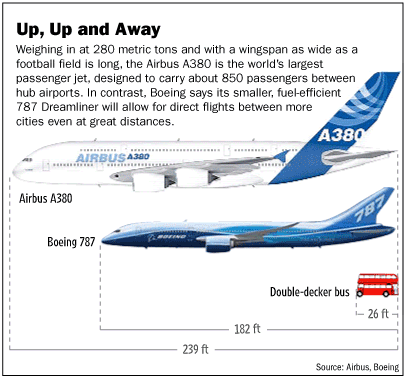
The airline industry has been hit hard by peak oil, and global warming. In the pocket book and in the public relations arena (its amazing how they convinced us all that the white clouds comming out the back of planes were not exahust but rather “comtrails”). Virgin airlines headed by crazy rich (and sort of crazy) Richard Branson, have just mixed it up a bit. They plan on flying the first commercial airplane on biofuel in 2008.
Boeing and Virgin Atlantic today announced an environmental partnership, which includes an order for 15 787-9 Dreamliners, marking the largest 787 order to date for Europe. The order, worth approximately $2.8 billion at list prices, was previously listed on Boeing’s Orders and Deliveries Web site and attributed to an unidentified customer. The order also includes options for an additional eight 787-9s and purchase rights for an additional 20 787s.
“Virgin Atlantic is pleased to introduce the Boeing 787 Dreamliner as our aircraft of the future,” said Steve Ridgway, chief executive officer, Virgin Atlantic. “This revolutionary aircraft will bring a step change to the industry, substantially reducing environmental impact and incorporating innovative design and advanced technology, while providing an enhanced flying experience for our passengers.”
The environmental partnership includes a joint biofuel demonstration aimed at developing sustainable fuel sources suitable for commercial jet engines and the aviation industry. The demonstration, scheduled for 2008 using a Virgin Atlantic Boeing 747-400, is being worked jointly with GE Aviation and Virgin Fuels. Further details will be announced later this year.
In addition, Boeing and Virgin Atlantic are working together on reducing fuel burn and cutting aircraft emissions on the ground by exploring alternatives to traditional aircraft operations at airports. For example, Boeing and Virgin Atlantic are partnering on trials of towing airplanes to “starting grids,” areas close to the active runway to start engines preflight, with a goal of reducing fuel consumption and carbon emissions by up to 50 percent, as well as limiting community noise. Trials conducted thus far at London’s Heathrow and Gatwick Airports and San Francisco International Airport have produced positive results, and work continues to develop alternative operational procedures at the world’s busiest airports.
I am sorry about the music really.
“Virgin Atlantic has demonstrated extraordinary leadership within our industry on addressing environmental impact, and Boeing is proud that the 787 Dreamliner is such an important ingredient of the airline’s plan for the future,” said Scott Carson, president and chief executive officer, Boeing Commercial Airplanes. “Working together in partnership, Boeing and Virgin Atlantic will develop innovative, environmentally progressive solutions to provide greater fuel efficiency and lower aircraft emissions.”
The Boeing 787 Dreamliner, scheduled for entry into service in 2008, provides passengers with a better flying experience, and operators with a more efficient commercial jetliner. With the 787 Dreamliner, Boeing continues its leadership and innovation with a mostly composite airplane that uses 20 percent less fuel per passenger than similarly sized airplanes. The 787 is designed for the environment with lower carbon emissions and quieter takeoffs and landings.
Sir Richard Branson, Chairman of Virgin Atlantic, commented:
“Virgin Atlantic is totally focused on delivering a cleaner airline in the air and on the ground, and our order today will significantly cut carbon emissions per 787 Dreamliner flight. With this dynamic new plane, our customers will get the world’s best customer service onboard combined with world-class engineering throughout. The 787 Dreamliner symbolizes the environmentally-kinder aircraft of the future – cleaner, quieter, lighter and truly the best experience in the air.”
Others in the industry are noticing the 787’s fuel savings. Since the 787 launch in April 2004, 44 customers worldwide have logged 544 orders worth more than $75 billion at current list prices, making the Dreamliner the most successful commercial airplane launch in history.
It seems that the 08 biofuel test caught some in the industry by surprise.
However, converting an aircraft to run on biofuel was thought to be a much longer-term project and the announcement from Virgin today will surprise those in the industry who have scorned the idea.
Virgin hopes that biofuel-powered aircraft could be operating commercially within five years, which could help to cut significantly the airline industry’s carbon dioxide emissions. At present air travel contributes 2 per cent to 3 per cent of climate-change gases, but that level is increasing as the activity expands. The industry is investing in lighter aircraft and new engines to improve fuel efficiency, but biofuels could eliminate oil dependence entirely.
Sir Richard Branson, the chairman of Virgin Atlantic, launched an alternative fuels division last year, pledging the profits from his airline and trains for the next ten years.
A source close to the biofuel project said: “Everyone was saying that flying a plane with alternative energy sources was a decade away, but it is going much faster than that. The demonstration by a 747 next year will be a milestone in the airline industry’s attempts to reduce its CO2 emissions and cut its fuel bills.â€(via)
The U.S. military has been working on biofuels for cargo lifters for a while now. Of course, their press relases aren’t as snazzy.
Great! I love to see the green movement flex its muscles successfully! I wonder how much more will change after the Live Earth concerts this July? I suspect a lot of the musicians performing fly more than they’d like…
The plan is great for green, just a bit delayed. :)
By the way the music is great ;)